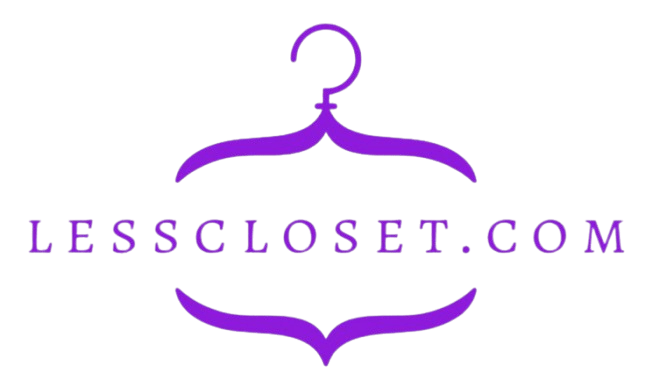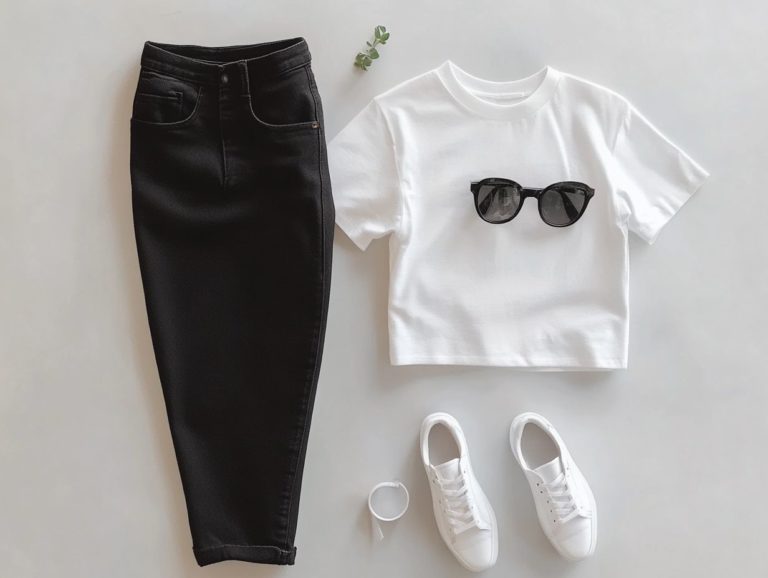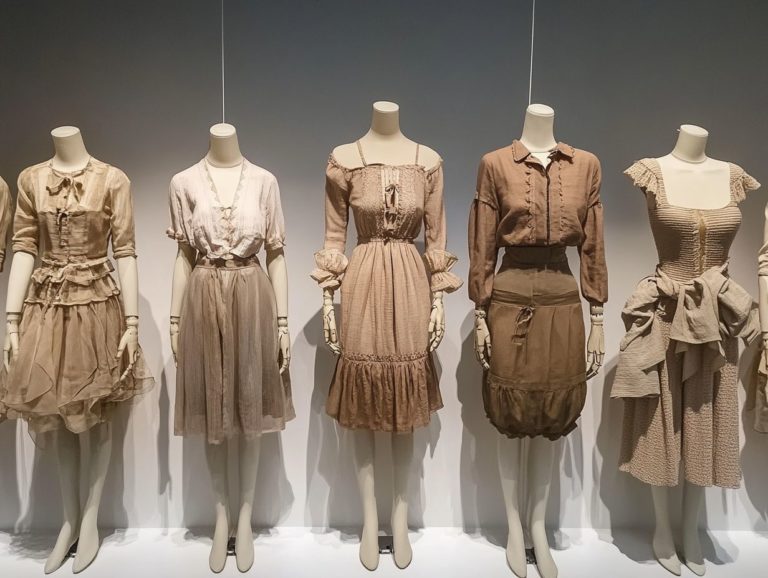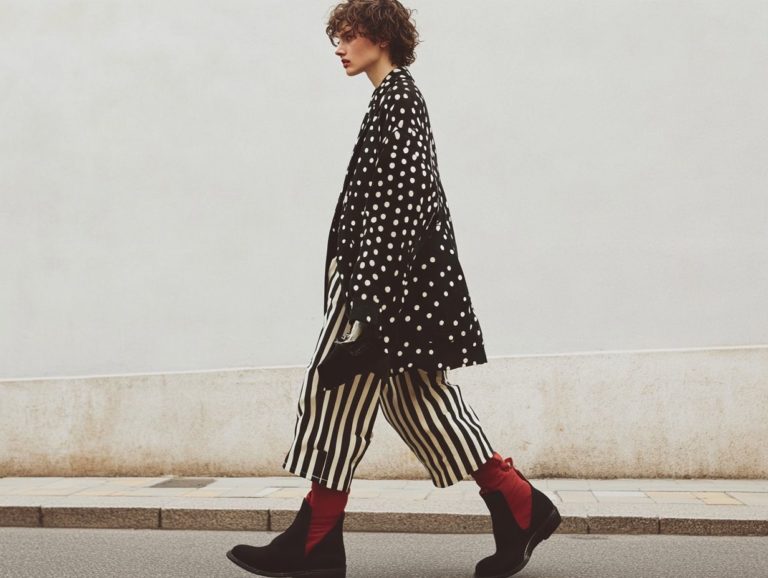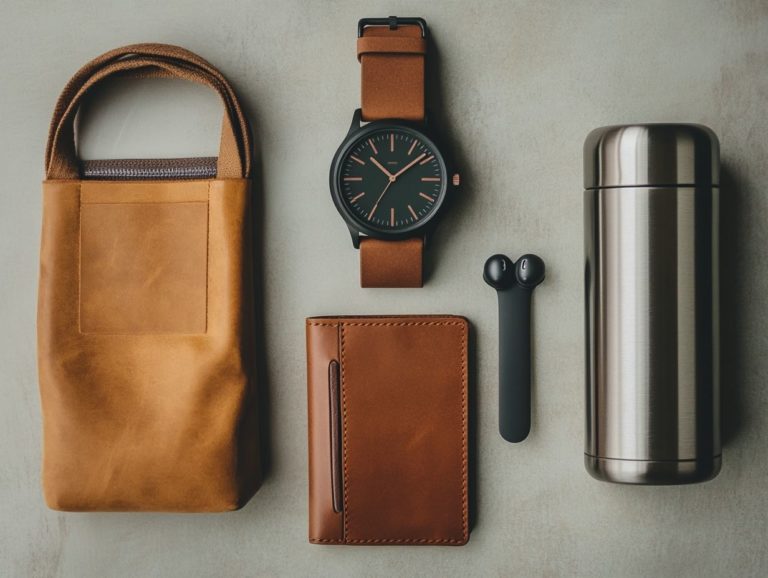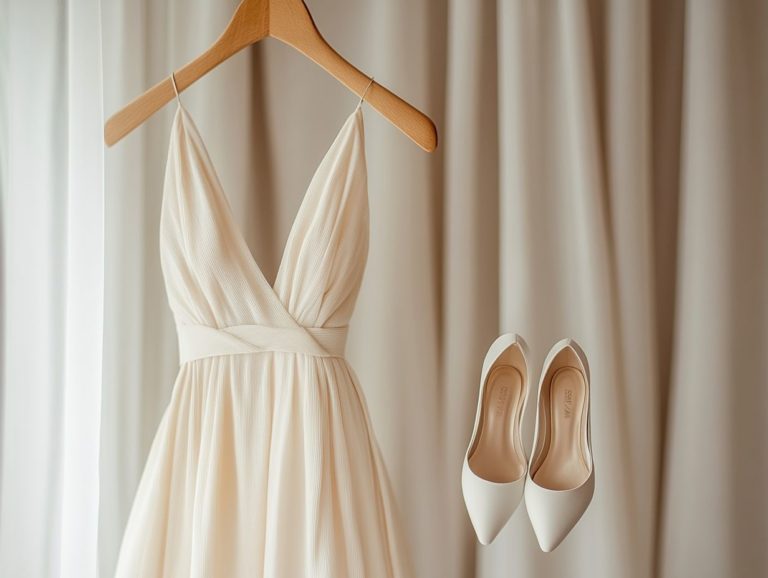The Minimalist’s Guide to Eco-Friendly Fashion
In a world that s becoming increasingly conscious of its environmental impact, eco-friendly fashion transcends mere trendiness it’s a lifestyle choice that reflects your values.
This guide delves into the essentials of eco-friendly fashion, showcasing its myriad benefits, from minimizing environmental harm to supporting social and ethical practices.
Discover sustainable materials and innovative production methods that truly make a difference. You ll also find practical tips for seamlessly integrating these choices into your wardrobe.
Learn how to care for your eco-friendly pieces and breathe new life into beloved favorites. Embrace a fashion approach that not only enhances your appearance but also aligns with your commitment to the planet.
Contents
- Key Takeaways:
- Benefits of Choosing Eco-Friendly Fashion
- Eco-Friendly Materials and Production Methods
- How to Incorporate Eco-Friendly Fashion into Your Wardrobe
- Maintaining Your Eco-Friendly Wardrobe
- Frequently Asked Questions
- What is eco-friendly fashion?
- How can I incorporate eco-friendly fashion into my minimalist wardrobe?
- Why should I care about eco-friendly fashion as a minimalist?
- Is eco-friendly fashion more expensive?
- Can I still follow fashion trends while being eco-friendly?
- What other sustainable practices can I adopt as a minimalist?
Key Takeaways:
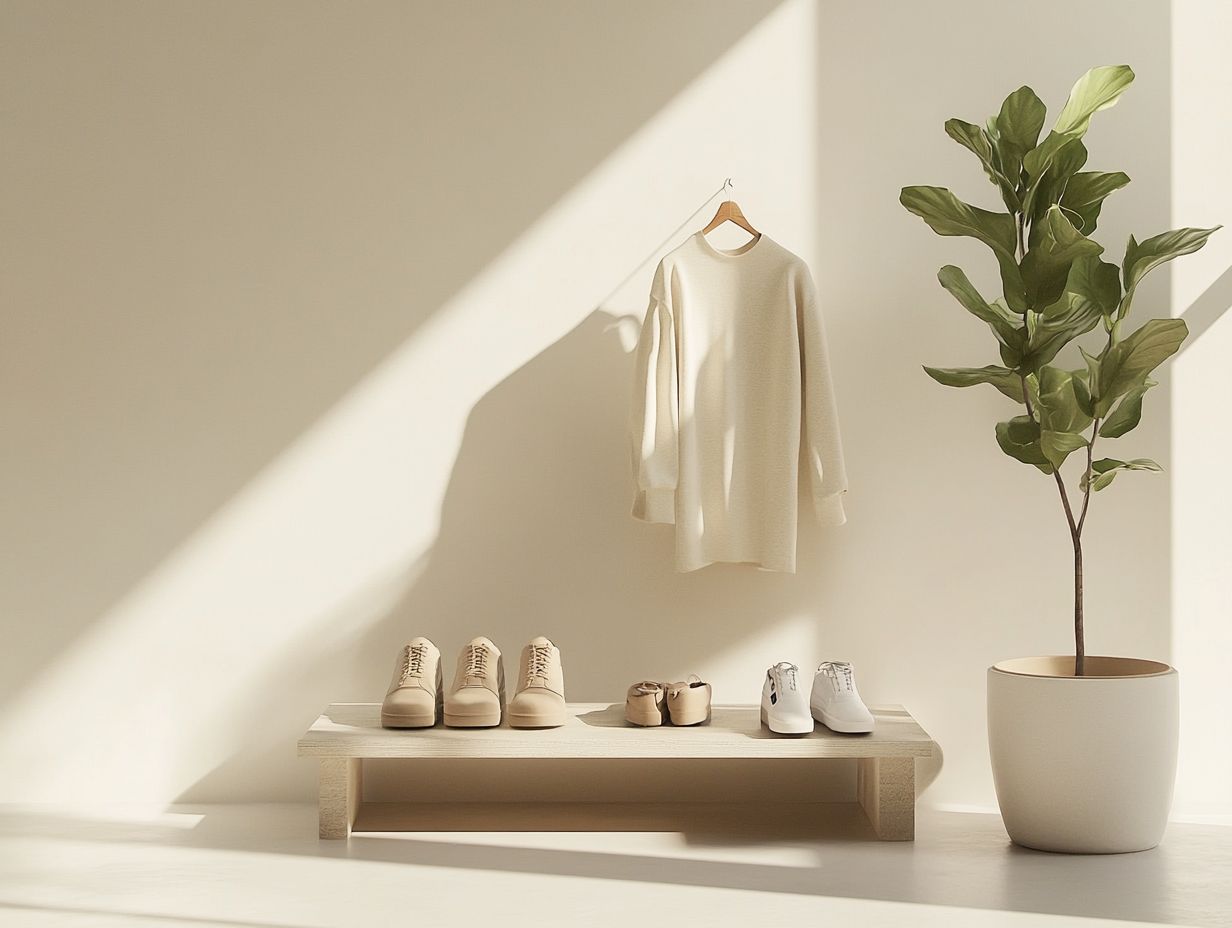
- Eco-friendly fashion benefits the environment and people, making it a mindful choice for consumers.
- Choosing sustainable materials and production methods can reduce the negative impact of fashion on the planet and promote social and ethical practices, encouraging a minimalist approach.
- Incorporating eco-friendly fashion into your wardrobe is easy and can be done through conscious shopping, styling, and caring for your clothing. Upcycling and repurposing can also extend the life of your sustainable pieces.
What is Eco-Friendly Fashion?
Eco-friendly fashion represents your commitment to sustainability. It places ethical practices and eco-conscious choices at the forefront of clothing production and consumption.
This approach emphasizes sustainable materials, like organic cotton and eco-friendly denim. These materials help reduce waste and promote a minimalist wardrobe filled with core pieces that stand the test of time.
Designers and brands are increasingly adopting a minimalist aesthetic. They craft timeless pieces that resonate with contemporary sensibilities while making a significant impact on the fashion landscape.
The principles of this movement align perfectly with the rising trend towards sustainable fashion. Each garment is designed with intention and durability in mind.
By embracing a minimalist lifestyle, you are encouraged to choose fewer items that offer versatility and longevity. This thoughtful selection process helps curb overconsumption and highlights the importance of ethical practices at every stage of production.
Minimalist brands tend to focus on neutral palettes and classic cuts. This ensures that each piece retains its relevance across seasons, further reinforcing the ethos of sustainability in your clothing choices.
Benefits of Choosing Eco-Friendly Fashion
Opting for eco-friendly fashion presents a wealth of advantages. From waste reduction to championing sustainable brands, this approach emphasizes quality over quantity and upholds ethical practices in production.
This mindset encourages you to cultivate a minimalist wardrobe. One that is thoughtfully curated with timeless pieces designed to endure both the passage of time and the ebb and flow of trends.
Environmental Impact
The environmental impact of eco-friendly fashion is truly significant. Its capacity to reduce waste by utilizing sustainable materials like organic cotton and recycled fabrics minimizes the fashion industry’s carbon footprint.
By prioritizing eco-conscious choices, you contribute to reducing pollution. You also help foster a circular economy, meaning discarded clothing can be repurposed instead of ending up in landfills.
This transition conserves vital resources like water and energy. It also supports biodiversity by curbing the chemical runoff associated with conventional textile production.
You may find yourself increasingly drawn to brands that emphasize ethical practices and natural dyes. This promotes a more resilient ecosystem.
Embracing eco-friendly fashion is far more than just a passing trend; it plays a crucial role in safeguarding our planet for future generations.
Start your sustainable fashion journey today! Choose eco-friendly pieces that reflect your values.
Social and Ethical Impact
The social and ethical impact of eco-friendly fashion is profound. It promotes ethical practices and advocates for fair labor conditions within the fashion industry. This approach appeals to a discerning shopping audience that values sustainability.
This movement reshapes how brands operate and nurtures a deeper connection between you and the origins of your clothing. Many brands seek certifications that show a company’s commitment to social responsibility. These certifications ensure adherence to rigorous standards for environmental and social performance. They indicate that these companies prioritize not just profit but also people and the planet.
Adopting a minimalist mindset aligns beautifully with conscious consumerism. It encourages intentional purchases that emphasize quality over quantity. This shift cultivates a culture of mindfulness, inspiring you to support brands that are transparent and dedicated to ethical production processes. Additionally, you can explore zero waste fashion tips for a sustainable closet to further enhance your conscious choices.
Eco-Friendly Materials and Production Methods
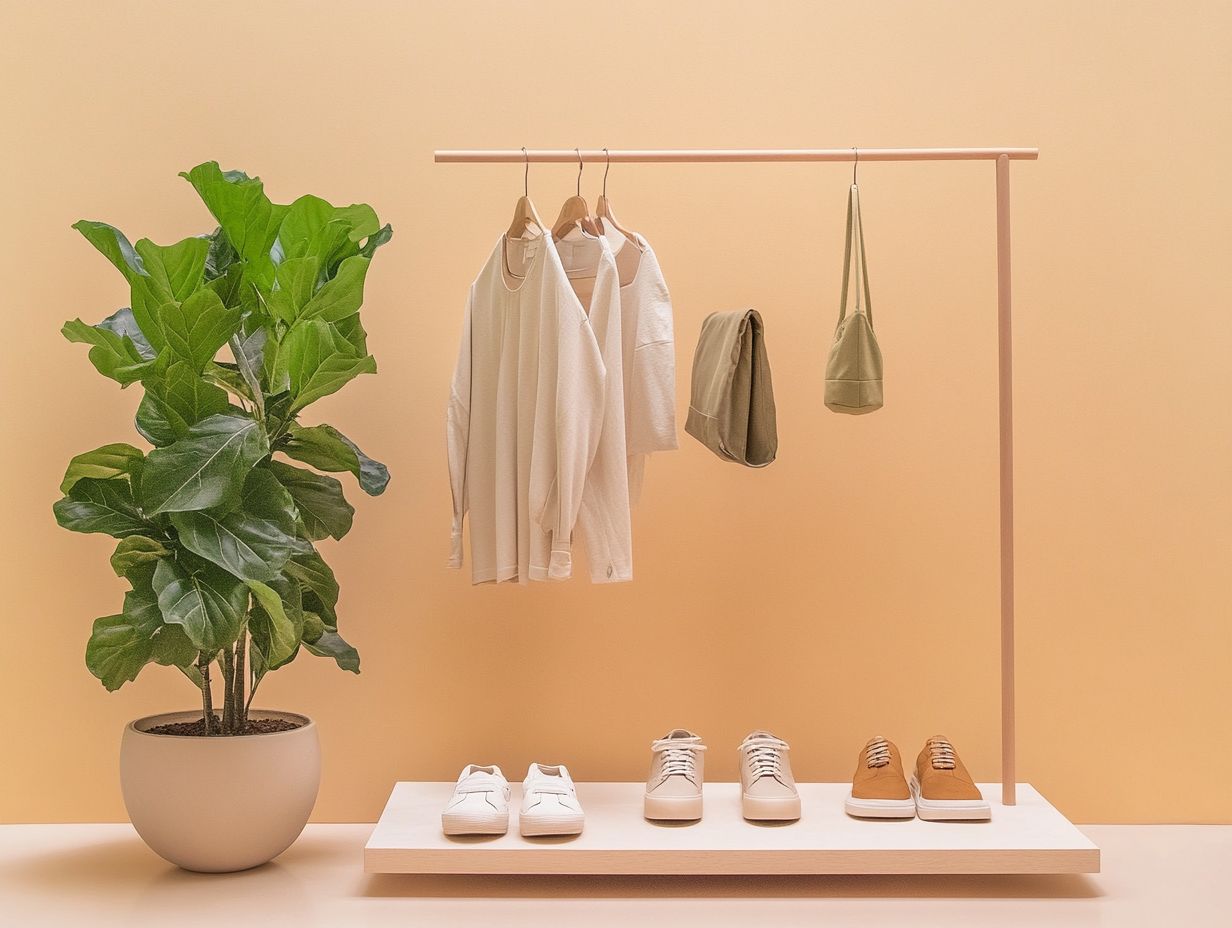
Eco-friendly materials and production methods lie at the core of sustainable fashion. By choosing materials like organic cotton and innovative options such as sustainable denim, you positively contribute to the environment while elevating the quality of your minimalist wardrobe.
Embracing these choices reflects a commitment to both style and sustainability. This ensures that your fashion statements are as conscientious as they are chic.
Sustainable Fibers and Fabrics
Sustainable fibers and fabrics, such as organic cotton, linen, and other eco-friendly options, are essential in eco-friendly fashion. They ensure that the high-quality textiles you choose are both stylish and environmentally responsible.
These materials help reduce the carbon footprint linked to traditional textile production. They also possess qualities that heighten their allure. For instance, organic cotton is soft and breathable, making it perfect for your everyday wardrobe. Linen, derived from the flax plant, offers natural cooling properties, ideal for warm weather.
Fabrics like Tencel, crafted from sustainably sourced wood pulp, are biodegradable and deliver a luxurious drape. By incorporating these fibers into minimalist clothing, designers create timeless pieces that defy the transient nature of fashion trends.
Organic and Fair Trade Production
Organic and fair trade production processes guarantee that eco-friendly fashion is sustainable and socially responsible. These methods support workers and promote transparency throughout the fashion supply chain.
These approaches prioritize the use of environmentally friendly materials. They reduce harm to the planet while ensuring fair wages and safe working conditions for artisans. This commitment builds a vibrant community of conscious shoppers.
When you embrace the principles of organic and fair trade, minimalist brands showcase their dedication to sustainable fashion. They foster trust within their audience. Transparency in these production methods enhances authenticity and encourages you to make conscientious purchasing decisions that reflect your values.
How to Incorporate Eco-Friendly Fashion into Your Wardrobe
Incorporating eco-friendly fashion into your wardrobe elevates your style while championing a sustainable lifestyle. By embracing choices like capsule wardrobes and timeless pieces, you can curate a minimalist wardrobe that embodies both elegance and functionality.
This approach enhances your personal aesthetic and reflects a deeper commitment to environmental responsibility. It emphasizes the power of simplicity.
Start today by exploring eco-friendly brands and considering the impact of your choices. Your wardrobe can be a canvas for sustainability!
Tips for Shopping and Styling
When you embark on your journey to discover eco-friendly fashion, embrace thoughtful shopping by selecting minimalist clothing and essential accessories that not only reflect your unique style but also support sustainable brands committed to ethical practices. This ensures you have a well-curated selection of versatile silhouettes.
This approach helps reduce waste and ensures that every piece in your wardrobe serves a meaningful purpose. By understanding minimalism in fashion, you can prioritize quality over quantity by investing in timeless garments that transcend fleeting trends, encouraging longevity in your collection.
By understanding color analysis the study of colors that suit you best you can significantly elevate your wardrobe choices. This allows you to create a harmonious minimalist palette that complements your understated luxury.
Maximize outfit combinations by effectively pairing your garments. Keep in mind that the goal is to choose items that resonate with your personal aesthetic while minimizing your environmental impact.
Maintaining Your Eco-Friendly Wardrobe

Maintaining your eco-friendly wardrobe is crucial for ensuring both longevity and sustainability. By dedicating time to care for sustainable materials and exploring upcycling methods, you enhance the durability of your clothing and embrace a minimalist lifestyle that reflects your values.
Investing in this conscious approach elevates your style while being kind to the planet.
Caring for Sustainable Materials
Caring for sustainable materials is essential in eco-friendly fashion. Focus on high-quality fabrics that require specific maintenance to ensure they last longer and minimize their environmental impact.
By adopting thoughtful washing practices like using cold water and gentle detergents you can help preserve the integrity of these fabrics. Opt for air drying instead of using the dryer; it saves energy and extends the life of garments made from delicate materials.
Embracing minimalist clothing as a lifestyle choice is commendable. However, how you care for these items is vital in reducing waste. Rotating your pieces and investing in capsule wardrobes with the ultimate guide to minimalist wardrobe essentials can significantly enhance the longevity of high-quality textiles, allowing you to foster a more sustainable approach to your personal style.
Upcycling and Repurposing Clothing
Get creative with upcycling and repurposing clothing! These practices have become essential in eco-friendly fashion, allowing you to extend the life of your garments while minimizing waste. Embrace a more minimalist journey that reflects modern sensibilities.
These innovative methods breathe new life into your beloved pieces and promote sustainability in an industry often criticized for its environmental impact. Transforming outdated denim into trendy tote bags or turning oversized sweaters into cozy blankets lets you unleash your creativity while making a positive contribution to the planet.
Such creative initiatives cultivate a unique wardrobe filled with versatile items that truly reflect your personal style. Upcycling and repurposing encourage a valuable minimalist mindset shift towards appreciating what you already possess, empowering you to make conscious choices that champion a sustainable lifestyle.
Frequently Asked Questions
What is eco-friendly fashion?
Eco-friendly fashion uses sustainable materials and practices, like organic fabrics and ethical labor, to reduce environmental impact.
How can I incorporate eco-friendly fashion into my minimalist wardrobe?
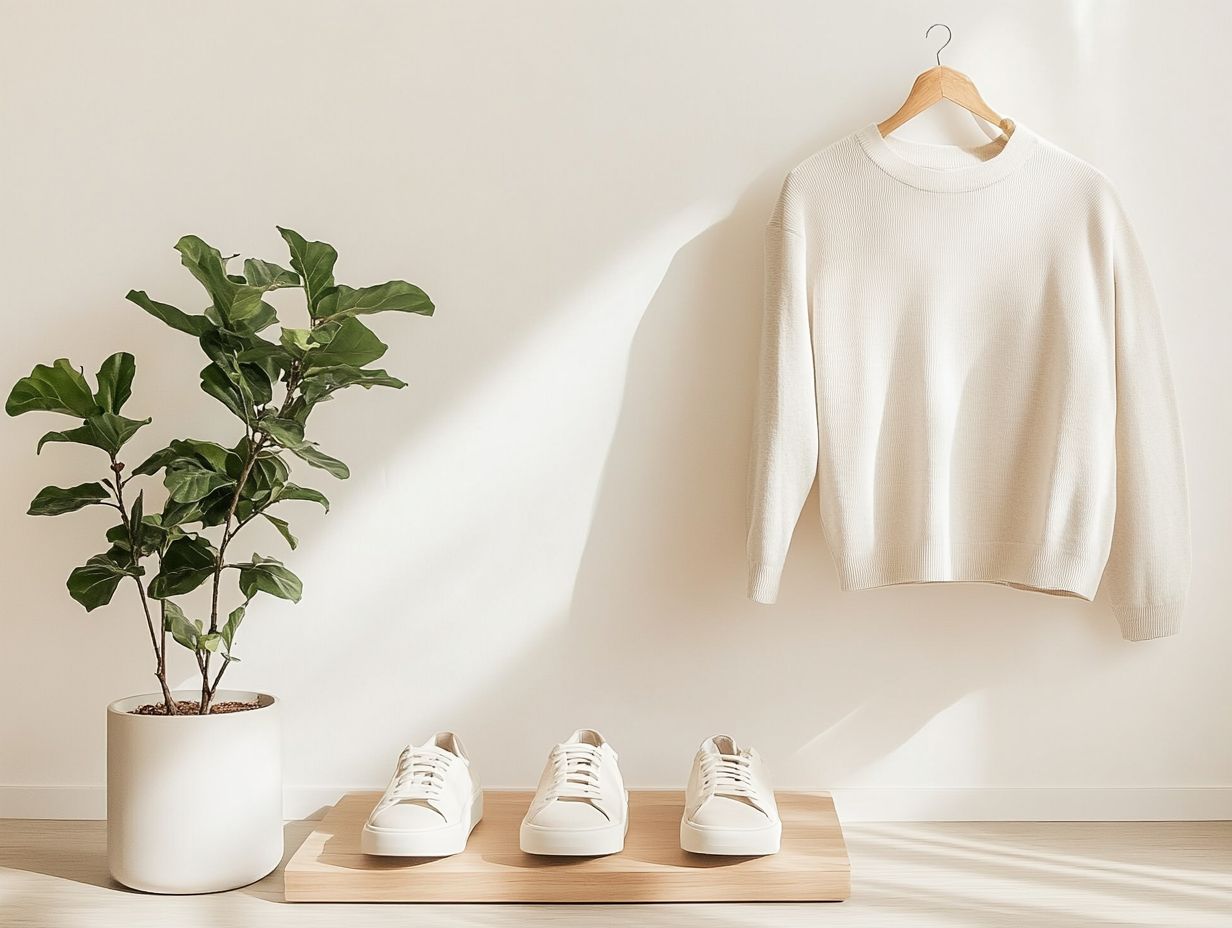
One way is to invest in high-quality, timeless pieces that are made to last. This avoids the cycle of constantly buying fast fashion items, which refers to inexpensive clothing produced rapidly by mass-market retailers in response to the latest trends.
You can also opt for second-hand or vintage clothing. Alternatively, support small, sustainable brands that prioritize sustainability.
Why should I care about eco-friendly fashion as a minimalist?
As a minimalist, you likely value simplicity, functionality, and sustainability. Incorporating eco-friendly fashion into your wardrobe aligns with these values.
This choice can reduce your environmental impact while allowing you to explore the minimalist aesthetic and understated luxury in your everyday life.
Is eco-friendly fashion more expensive?
Some sustainable fashion brands may have higher price points. However, affordable options are also available.
Investing in high-quality, long-lasting pieces saves you money over time.
Can I still follow fashion trends while being eco-friendly?
Absolutely! Explore trendy eco-friendly alternatives that let you stand out while being kind to the planet.
Get creative and repurpose items in your own wardrobe. Being a minimalist means being intentional and avoiding mindless consumption!
What other sustainable practices can I adopt as a minimalist?
Take immediate action to reduce your waste today! Use reusable bags and containers.
Support local farmers and businesses, and minimize energy and water usage at home. Every little step counts!
Incorporating eco-friendly fashion into your life is not just a choice; it’s a movement. Embrace it today for a more sustainable future!
